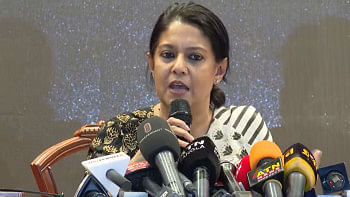Bangladesh's Untapped Treasure

Almost a kilometre long queue of people of different ages, sweating relentlessly under the blazing sun, is an everyday sight in Agargaon. A number of curiously busy men are seen running back and forth with papers near the queue of hundreds of extremely displeased people. Sometimes, these groups of 'busy' men are seen talking to the patrolling members of the law enforcing agencies and entering into one of the messiest and busiest public offices of Bangladesh which is the Department of Immigration and Passport.
These kilometre long queue, unrestrained activities of the illegal agents who extort money from the beleaguered applicants by promising them of quick service and corrupt men of law enforcing agencies who allow these agents to run their illegal activities in exchange of a good share of their daily income, are very regular scenes at this office. Anisul Islam, a passport applicant says, “Due to these agents, we, the normal applicants, have to suffer a lot. We have to wait in the queue hours after hours as these agents get their tasks quickly breaking the serial thanks to the passport officials.”
Just a few metres away from the passport office we can see similar pictures in front of the Election Commission Office where hundreds of people are standing in queue to solve their problems with the national ID cards. However, in between these two over-crowded, over-committed offices, there is another public office whose officials pass their whole working day almost doing nothing. This office is Sher-e-Bangla Nagar sub post office, a branch of The Bangladesh Post Office which is one of the most widespread government organisations of the country. There are eight thousand and five hundred post offices all over the country reaching the remotest part of the state where very few organisations can operate.
However, in this age of cellular phone network and email services, much of the functionalities of the post offices have become obsolete. Regardless of this fact, the government has to allocate a huge amount of budget (Tk 520 crore in 2014-15) for it whereas revenue earned from the postal services is quite negligible (only 253 crore in 2014-15). In a bid to revive its capacity, the government decided to equip the office with electronic money transfer service. However, the advent of easier cell phone based money transaction services such as Bkash and Mobicash have presumably destroyed the market of this service too. Recently, the post office took an initiative to provide e-commerce services which has not been implemented yet.

There is no doubt that despite the current sluggish performance of this department; Bangladesh's postal service has the immense potential to serve its people thanks to its amazing infrastructural resources. Post offices can be the one-stop service centres for many public services such passport, national ID cards, submission of utility bills etc. In the United Kingdom, during the Postal Services reform from 2010-2015, UK's postal service introduced 170 new products to its citizens such as bill pay services, issuing citizen cards, telephony services etc.
Tarun Kanti Sikder, Director (Mails) of Bangladesh Postal Service said, “We are also planning to utilise the infrastructural resources of the post offices by establishing e-centre. In one of the two rooms of the post office, some computers with internet connection will be provided and the citizens will be able to get services from this facility such as taking photos, accessing emergency information etc.”
“These centres will be operated by a young entrepreneur who will share a percentage of his revenue with the postal department. Thus, this initiative will also help to eradicate the unemployment problem in the rural area,” adds a hopeful Tarun. Although government owned Upazila Resource Centres are already providing these kinds of services, it is certainly an appreciable step.
Recently, the Prime Minister has inaugurated 10 new passport centres in different districts to make this essential citizen service more accessible. However, by utilising the huge network of Bangladesh Postal Service, these services such as issuance and delivery of passport, national ID cards can be made more accessible, hassle free and also cost effective. If the government can ensure sustainable reformation in the postal service by increasing its capacity to provide these essential services, there is no doubt that this important sector of the state can earn a huge amount of revenue for the nation.


 For all latest news, follow The Daily Star's Google News channel.
For all latest news, follow The Daily Star's Google News channel. 



Comments